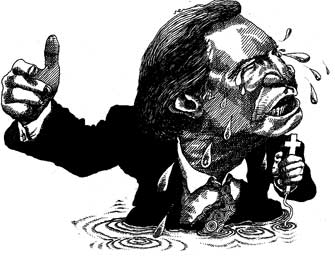 In
1972, Edmund Muskie was a front-runner for the presidential nomination of the
U.S. Democratic Party. During the New Hampshire primary, he choked with anger
and seemed to cry because of a couple of nasty newspaper articles. One was a hoax,
the other an article attacking his wife. The result was that he was perceived
as weak and incapable of leadership, and his campaign collapsed. In
1972, Edmund Muskie was a front-runner for the presidential nomination of the
U.S. Democratic Party. During the New Hampshire primary, he choked with anger
and seemed to cry because of a couple of nasty newspaper articles. One was a hoax,
the other an article attacking his wife. The result was that he was perceived
as weak and incapable of leadership, and his campaign collapsed.
We've come a long way since then. Indeed we've learned to value
men's tears. Today, crying in public can be a good political move. When Jimmy
Swaggart, the well-known TV evangelist, was found in the company of a prostitute,
he went on the air sobbing "I have sinned." Wiping crocodile tears from
his face, he admitted that he had been involved in more than ministering to the
woman. More recently, a former hockey player, Sheldon Kennedy, cried as he admitted
to drinking eight beers before crashing an expensive Hummer, causing $20,000 damage.
While seeking forgiveness for his drinking and for the marijuana found in his
possession, he attributed both offenses to his trauma from having been abused.
And, the world recently witnessed a teary-eyed President Clinton confess: "I
have sinned."
Nowadays, it appears that big boys do cry when they are caught
doing something they aren't supposed to do. Crying, whether it is a quiet trickle
down the cheek or a full-blown sob, has become a way to convince others that one
is repentant.
All of this is a result of feminist efforts to change male behaviour,
to feminize men. The "strong silent type" is no longer to be admired.
Rather, he is regarded as a defective person -- a paternalistic dinosaur, conditioned
to withhold his emotions, to be insensitive, incapable of intimacy. The modern
man must be trained to be empathic, emotionally expressive and courageous in exposing
his vulnerability and pleading for help. Only men capable of shedding tears
are real men, we are told.
What do these new tears mean? When babies cry, it is thought to
be an inborn response, a cry for the protective presence of the parent. Babies
cry because they are hungry, thirsty, wet or in pain. When adults cry, their tears
can mean much more -- tears of grief, joy, surprise, gratitude and even exhaustion.
But according to modern thinking, crying is also a form of communication with
an evolving language all of its own. Jeffrey Kottler, a psychologist who describes
himself as a "student of tears," believes that "we are approaching
a new era in the language of tears, one in which -- as never before — the
benefits of selective crying are appreciated."
Crying isn't always spontaneous; not all tears are genuine. An
actor learns to cry on cue. Tom Hanks's tears of joy in Philadelphia won him an
Oscar. A trembling speech in Coming Home earned Jon Voight the Best Actor's award.
But crying on cue does not require acting lessons. Virtually anyone
can fake it. Remember Susan Smith? Her tears brought waves of public sympathy
and led the police on a wild goose chase for the abductor of her two small children
until it became evident that she had drowned
them.
For centuries, crying was considered one of the female wiles.
Women cried to get sympathy, make others feel guilty, avoid responsibilities and
come out on top. As far back as the 1600s, Samuel Pepys recognized such a capacity
when he wrote in his famous Diary: "And she so cruel a hypocrite that she
can cry when she pleases." Not much has changed in the last few centuries.
Recent surveys indicate that almost 50 per cent of women admit using tears to
get their way in disputes.
Men seem to have learned the lesson. Somehow, men have been persuaded
to devalue their masculine strengths and their faculties of reason in order to
appear more nurturing, sensitive and emotional. Thus, we can expect to see more
and more of them crying in public. Swaggart, Kennedy and Clinton may be the forerunners
of a new era in our social evolution: homo criens -- men who cry.
Crying is now part of our cultural motif, not just in personal
moments of anguish or exhilaration, but on public occasions, too. It comes in
handy when you want to appeal to emotion rather than reason. Recent studies have
shown that accusers who cry in court are perceived to be more honest, credible
and reliable than those who remain calm, regardless of whether the facts support
their stories.
Kottler predicts that "we are approaching a time of tears."
But will these new tears reflect honest expressions of deeply felt emotion, or
will they be more superficial and self-serving?
While nobody reasonably subscribes to the Big-Boys-Don't-Cry belief
system that brought down Muskie, how do we cope with the deluge of contrived tears?
Once we worried that civilization would come to a cataclysmic end, the result
of male aggression. Perhaps T. S. Eliot was more accurate when he predicted: "This
is the way the world ends, not with a bang but a whimper."
Cartoon by Lurie |


 In
1972, Edmund Muskie was a front-runner for the presidential nomination of the
U.S. Democratic Party. During the New Hampshire primary, he choked with anger
and seemed to cry because of a couple of nasty newspaper articles. One was a hoax,
the other an article attacking his wife. The result was that he was perceived
as weak and incapable of leadership, and his campaign collapsed.
In
1972, Edmund Muskie was a front-runner for the presidential nomination of the
U.S. Democratic Party. During the New Hampshire primary, he choked with anger
and seemed to cry because of a couple of nasty newspaper articles. One was a hoax,
the other an article attacking his wife. The result was that he was perceived
as weak and incapable of leadership, and his campaign collapsed.